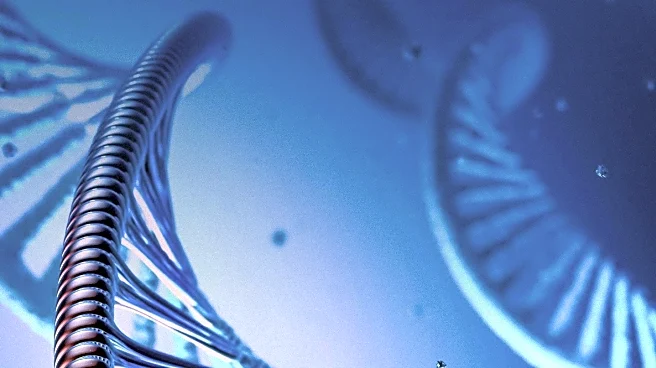What's Happening?
Researchers have discovered that eight psychiatric conditions, including autism, ADHD, schizophrenia, bipolar disorder, major depressive disorder, Tourette syndrome, obsessive-compulsive disorder, and anorexia, share a common genetic basis. The study, published in Cell, identified specific genetic variants that are active during brain development and influence multiple developmental stages. These pleiotropic variants are involved in numerous protein-to-protein interactions and are active across various brain cell types. The research highlights the potential for developing treatments targeting these shared genetic factors, which could address multiple psychiatric disorders simultaneously. The study builds on previous findings from 2019, where 109 genes were linked to these disorders in different combinations.
Why It's Important?
The discovery of shared genetic factors among multiple psychiatric disorders could revolutionize treatment approaches. By targeting these common genetic variants, healthcare providers may develop therapies that address several conditions at once, potentially improving outcomes for millions of individuals. This approach could streamline treatment processes, reduce healthcare costs, and enhance the quality of life for those affected by these disorders. Given the World Health Organization's estimate that 1 in 8 people globally live with a psychiatric condition, the implications of this research are significant for public health and medical research.
What's Next?
Further research is needed to understand the mechanisms by which these pleiotropic genetic variants influence brain development and contribute to psychiatric disorders. Scientists may explore the development of drugs or therapies that specifically target these shared genetic factors. Collaboration between geneticists, neuroscientists, and pharmaceutical companies could accelerate the translation of these findings into clinical applications. Additionally, ethical considerations regarding genetic testing and personalized medicine will need to be addressed as these treatment strategies evolve.
Beyond the Headlines
The study challenges traditional views of psychiatric disorder classification, which often treat conditions as distinct entities. Understanding the genetic basis of pleiotropy could lead to a paradigm shift in how mental health disorders are diagnosed and treated. This research also underscores the importance of genetic research in uncovering the complex interactions within the human brain, potentially leading to breakthroughs in other areas of medicine.










